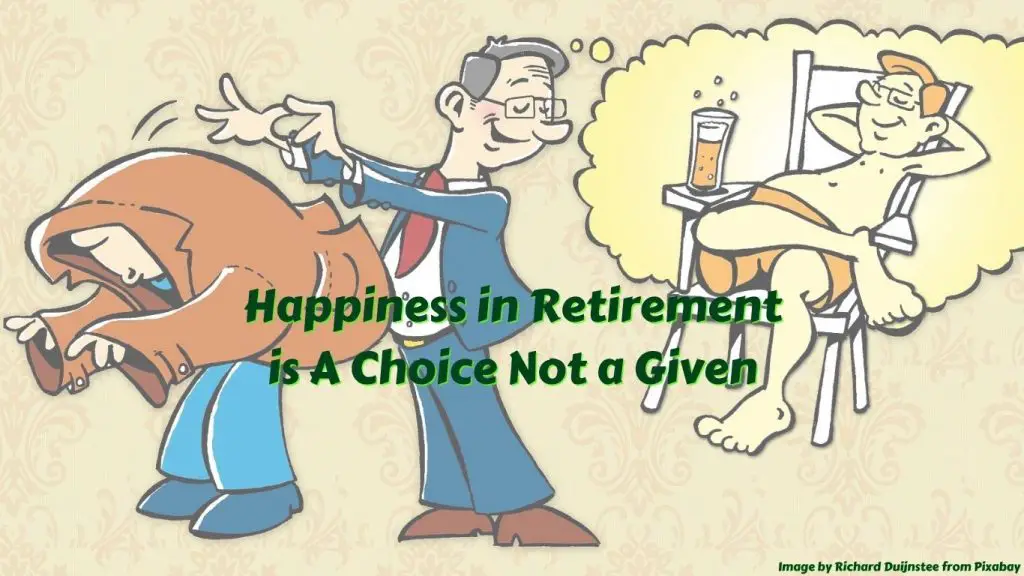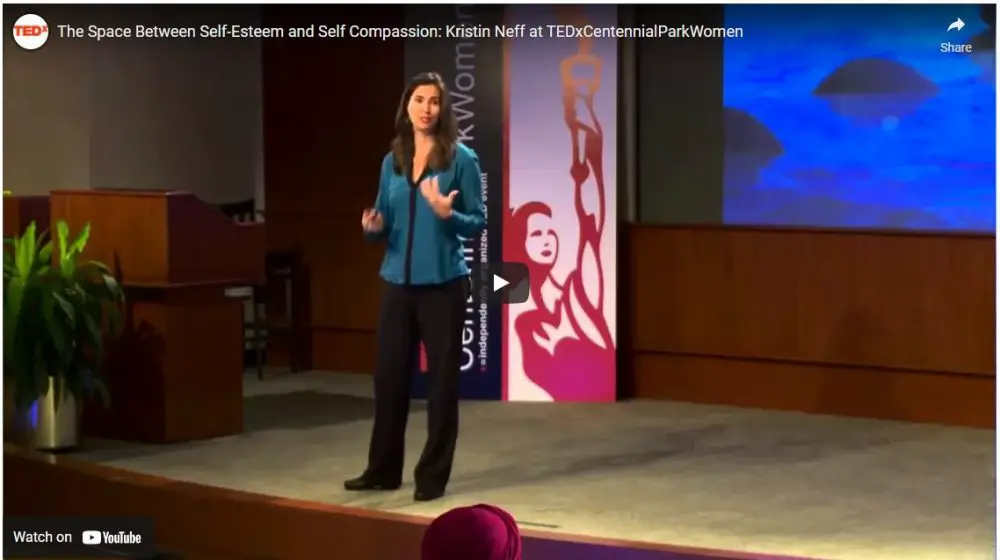Ever notice how some retirees are basically happy and content with life?
Whereas others complain about anything and everything to anyone who’ll listen. Not only are they unhappy souls, their unstated mission is to spread the negativity as misery loves company.
Happiness in retirement is a choice and one which each of us is wholly responsible for. Factors which greatly influence this include a positive mindset, living purposefully, self-worth and compassion to self / others.
Retirement should be the best years as it’s the opportunity to shed work related stress, pursue interests and enjoy this next chapter in life. Yet, happiness is elusive with far too many folks expecting everything to be different.
The North American culture rewards hard work and getting ahead. In retirement, a major paradigm shift occurs. Now, success is generally measured by how much was squirreled away in investments and savings.
While financial security is critical, money in itself doesn’t buy happiness. At best, it can rent a good time. Happiness is intangible and comes from within which is why it’s a choice and not a given.
In addition, it’s the people in our lives which greatly contribute to feeling happy and satisfied. We discuss this in our article, The Most Important Ingredient for Retirement Happiness.
1. Positive Mindset
You may have noticed that some people seem happy most of the time and others not so much. Everyone experiences ups and downs and it takes work to stay positive. Those with a negative mindset limit themselves from experiencing moments of joy.

How we choose to deal (or not) with events is a conscious decision. This is why happiness in retirement is a choice not a given.
Negativity Bias
We pay way more attention to negative events than positive ones.
Back in the caveman days, survival instinct required being highly attuned to danger. Deciding whether to fight or flee. This helped our ancestors survive wars, floods, drought and much more.
Effectively, our brains are still hard-wired this way. Any negative event captures our immediate attention and sticks with us. On the other hand, positive ones, while nice, tend to not be as memorable.
As an example, let’s say there’s an accident on the freeway and you’re stuck in traffic. Seeing your predicament, another motorist slows letting you into their lane.
An alternate reality is an endless stream of vehicles. After about 15 minutes, you’re fuming. By that point, even if someone lets you in, you’ll likely dwell on the frustration of being stuck.
To maintain a positive mindset requires focusing on the good things and not sliding into darker thoughts.
2. Purpose After Retiring
Throughout your career, whether you realized it or not, you had a sense of purpose. It might've been the satisfaction derived from work, raising children or just receiving a paycheck.
Regardless, it got you out of bed and kept you busy each day. The first thing most new retirees do is turn off their alarm clocks. After 30 plus years of work, they’re no longer on someone else's schedule.
They’ve earned the right to do what want and when they want. For the first weeks and months, everything feels wonderful.
Unfortunately, boredom can set in when you have nothing important to look forward to. This is a situation when a “who gives a crap” mindset can dominate.
Finding Purpose
The majority of new retirees struggle with finding something interesting and fulfilling. Common advice is to find a hobby or activity. Easier said than done for anyone who felt married to their job.
For instance, getting out and playing some golf might be fun. However, this probably isn’t going to become a passion which is done every day.
Hence, a more balanced approach is required which we discuss in the Ultimate Guide on Things to Do in Retirement.
3. Promotion of Self-Love
If you don’t love yourself, how can you expect anyone else to love you? Self-love is developing authentic unconditional acceptance of yourself and always striving to be your best.
The most common issues stem from our formative years. Many things can affect this such as:
All these can hold you back from experiencing true self-love and acceptance.
Improving Self-Love
As we’re all imperfect, we tend to sabotage ourselves with doubts and insecurities. Few of us truly understand or fully accept ourselves. The pathway to self-love begins with your relationship with yourself.
The first step is understanding who you are. Everyone of us is unique and special and deserves self-love. More often than not, anything holding us back is from the past. Once identified, it becomes easier to move forward.
The next step is recognizing everyone stumbles from time to time. Rather than beating yourself up, recognize your flaws and limitations from a realistic and objective perspective. We all make mistakes and experiencing life's difficulties is inevitable.
Finally, this is a life long journey taken one step at a time. Actions speak louder than words and daily behaviors reflect how much you value yourself.
Things like getting more exercise, eating better, proper sleep and occasionally rewarding yourself. Understanding yourself at a deeper level is necessary to attain self-love.
4. Self-Compassion and Kindness
If a close friend was suffering through a tough time; you’d likely be supportive, show compassion and kindness. Very few people would mercilessly criticize their flaws, weaknesses and personal failings.
Yet, we’re our own worst enemy and our inner voice the harshest critic. It may sound like the voice of a parent, a brother / sister or some other authority figure pointing out every inadequacy and shortcoming.
Self-compassion and kindness require the same gentleness to yourself that you give to others.
Practicing Self-Love
To outsmart the inner critic, you need to become aware of and quieten those negative judgments. For instance, "I can’t believe I ate a whole tub of ice cream" leads to “I’m weak, have no control and will never lose weight”.
Instead, acknowledge while you ate the ice cream, you’ll do better next time. In effect, accept your behavior and resolve to be better. Beating yourself up is counter productive and can even create a sense of learned helplessness.
Sometimes it’s helpful to journal your feelings. When on paper, everything becomes more objective. The inner voice has less emotional control. This can also be a powerful tool to better understand these fears and anxieties.
In summary, self-love requires reflection, acceptance and moving forward. By being gentle on yourself, you’re in a better position to become the person you want to be.
5. Self Worthiness
Self-worthiness is the acceptance and belief that you’re deserving of love and to being treated with respect. At the opposite end of the spectrum are feelings of inferiority and not belonging.
Even people who appear highly successful can suffer low self-worth. All too often they overcompensate through external measures such as accumulating money or possessions.
However, an expensive vehicle, impressive job title or a garage full of toys often become a crutch. While these are generally considered signs of success, they can also mask low self-worthiness.
Everyone of us is worthy of love, respect and healthy connections. The three “S” words (self-worth, self-love, and self-compassion) are interrelated. Deficits can and will erode happiness in retirement.
Improving Self-Worth
A helpful tool to enhance self-worth is a daily affirmation. The mind is like a computer and can be reprogrammed. Repeating something as simple as “I love myself and deserve to be loved” on a daily basis has proven to be effective.
While it might seem weird at first, allowing yourself to feel and believe can work wonders. After a while, it feels more comfortable boosting self-acceptance and feelings of worth.
6. Living in The Present Moment
Living in the present moment or mindfulness is giving your complete and undivided attention to what’s happening around you. In short, slow down and take time to stop and smell the roses.

Some studies suggest we spend about half our time mentally detached. Random thoughts pop in and out of our heads and our minds wander.
Even when someone is saying something, we’re not really listening. the majority of us have already formulated a response before they’ve finished speaking.
In spite of decades of research, we’ve only scratched the surface on understanding the power of the mind. It’s estimated we have 60,000 to 80,000 thoughts each day or a fresh thought every 1.2 seconds!
Many retirees fret about the future and what it might look like. The biggest fear is of outliving your savings. Our article, 8 Greatest Retirement Fears, captures this one as well as other prevalent concerns.
Dwelling on these fears and anxieties can rob you of retirement happiness. While the future is full of uncertainty, worrying about what might happen prevents you from living in the present.
Reliving the past also holds you back. While pleasant memories are comforting, you’re likely missing out on creating new ones.
Of greater concern is stewing over perceived slights and wrongs. This is toxic and akin to taking poison and somehow expecting the person who wronged you to suffer.
Tips For Living in The Present
Visualization improves performance and achievement of goals. Likewise, meditation is used to practice mindfulness and heighten awareness.
Both techniques regain control of thought processes, quiet the mind of distractions and help you be mindful. Cultivating a positive outlook is, also, part of living in the present. It doesn’t mean ignoring life’s troubles.
In fact, people with a positive attitude seem to be able to deal with these difficulties more effectively. In contrast, negative thinkers tend to whine and complain and thereby avoid addressing any issue.
Remember, we each have free will and a choice on how to live our life.
Closing Thoughts on Happiness in Retirement
Becoming happier is a conscious choice for which each of us is wholly responsible. Besides feeling good, it’s proven that happier people have better relationships, improved mental / physical health and live longer.
With life expectancy on the rise, it makes sense to turn retirement into your best years. Ultimately, happiness comes from within and is a choice rather than a given.


